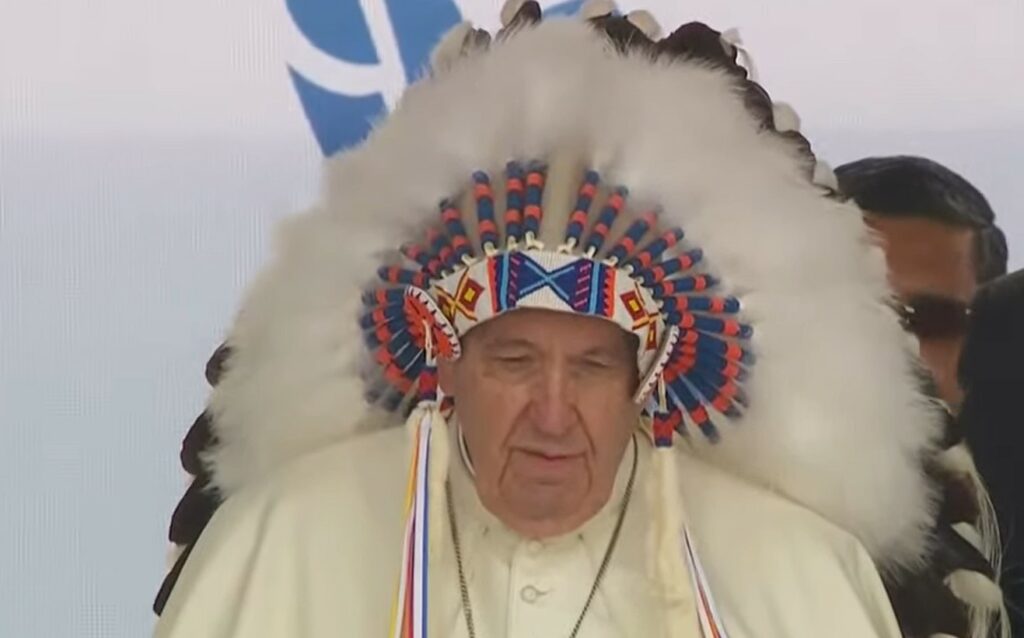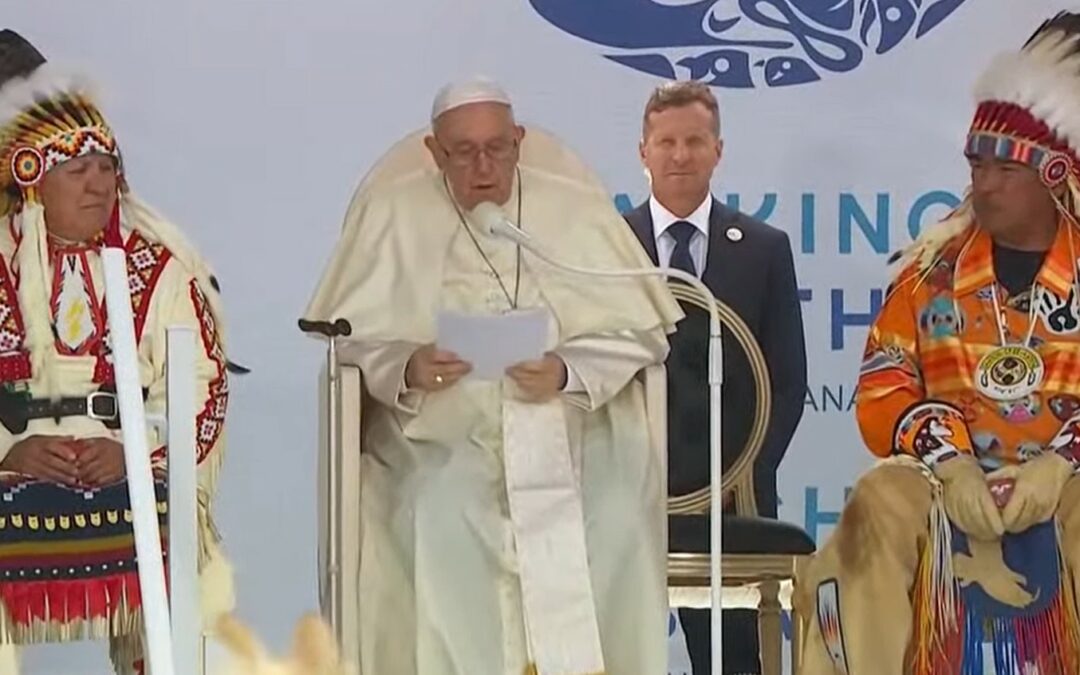The following story may contain distressing details
Thousands of Indigenous people converged Monday in the community of Maskwacis in Alberta to hear a long-awaited apology from Pope Francis and whatever other remarks the papal visit would bring.
Pope Francis visited the site of the former Ermineskin Indian Residential School the largest in Canada.
When Francis arrived, he prayed at a nearby cemetery where some residential school students were likely buried before speaking to a large open area of school survivors, their relatives and other supporters. Here he expanded on the apology he offered to a delegation of Indigenous people in the Vatican in March.
“I would like to begin what I consider a penitential pilgrimage,” he told those gathered. “I have come to your lands to speak of my sorrow and seek god’s reconciliation.”
Many were visibly emotional in the audience as the pope spoke while others sat with their eyes closed looking down.
“I recall the meetings we had in Rome 4 months ago – I was given two moccasins to signify those that never came back from residential schools… I will return these moccasins at the end of these words. These moccasins have kept alive my sense of sorrow indignation and shame. These moccasins also speak to us of a path to follow…so that the sufferings of the past can lead to a future of justice, healing and reconciliation.”
Francis spoke on the experiences he heard of many residential school survivors and the reawakening of trauma that reignites when the subject is brought up. However, he spoke on the importance to continue speaking on the issue.
“Forgetfulness leads to indifference,” said Francis adding that the opposite of love and life is indifference.
“To remember the devastating experiences at residential schools causes hurt and pain and yet it is necessary.”
The pope spoke on the negative affects of colonialism and assimilation and the loss of Indigenous language and culture.
“I am here because the first step of my penitential pilgrimage among you is to ask for forgiveness and telling you once more that I am deeply sorry.”
The crowd erupted into cheers when they heard the English translation of the Pope’s apology.
“I am Sorry for the way many Christians supported the colonizing powers that supressed Indigenous peoples. I apologize for the way many members of religious communities participated not only in their indifference but in projects of cultural destruction that culminated in the residential school system.”
“In the face of this deplorable evil the church kneels before God and implores for his forgiveness. I humbly beg forgiveness for the evil committed by so many Christians against Indigenous people.”
Will actions follow?
Many have called for action to follow the papal apology with Pope Francis indicating on Monday this is only the starting point.
“Begging pardon is only the first step,” he said. “No effort must be spared to create a culture to prevent such situations from happening.”
While Francis didn’t give many specifics on what actions would be taken, he promised an investigation into the matter, promised support to residential school survivors, and the writing of an apostolic exho
“Many of this will require time and patience… we are speaking of processes that need to penetrate hearts,” he said. “However, I hope my presence here and the work of the Canadian Bishops is a sign of our commitment to continue on this path.”
Francis also spoke on all the Indigenous communities across the country he would be unable to attend including Saskatchewan and ensured those in these areas to know that the words he is speaking is for every Indigenous person in Canada.
“I embrace all of you with affection.”

(PHOTO – Afterwards chiefs from Samson Cree Nation provided a head dress for Pope Francis to wear with some in attendance cheering this gesture. Screenshot from the live feed.)
Responses to the papal apology
Others offered their response to the apology at the former site of the Ermineskin Residential School.
Rose Mercredi, who attended the St. Anne’s Residential School in Prince Albert, had a simple message.
“A meaningful apology will mean reconciliation for me,” she said.
“We hope our encounter and the words you share with us will bring healing and hope for many generations to come,” said Chief Vernon Saddleback of Samson Cree Nation.
Cassidy Caron, President of the Metis National Council, believes this papal apology and remarks will resonate differently for everyone.
“I hope the survivors gathered here can take something away for them and their own personal healing journey,” said Caron.
However, some had a more reserved and critical approach with one survivor saying “Is it enough, will it ever be enough” and others saying concrete action needs to follow or the apology will not have the desired impact. Some pointed to a renunciation of the Doctrine of Discovery as a possible step in the right direction something that wasn’t addressed during Pope Francis’s remarks on Monday.
The week ahead
Francis will now travel to the Sacred Heart Church in Edmonton where he will speak to Indigenous people and parish members there.
Later in the week, the Pope plans to host a large outdoor mass at the Commonwealth Stadium in Edmonton and take part in a pilgrimage in nearby Lac Ste. Anne, before travelling to Quebec City and Iqaluit.
Francis arrived in Canada on Sunday for the six-day trip that is aimed at reconciliation with Indigenous people.
(TOP PHOTO: Screenshot of the live feed of Pope Francis’s address on Monday morning.)
Support is available for anyone affected by their experience at residential schools or by the latest reports.
A national Indian Residential School Crisis Line has been set up to provide support for former students and those affected. People can access emotional and crisis referral services by calling the 24-hour national crisis line: 1-866-925-4419.
Mental health counselling and crisis support is also available 24 hours a day, seven days a week through the Hope for Wellness hotline at 1-855-242-3310 or by online chat at www.hopeforwellness.ca.
